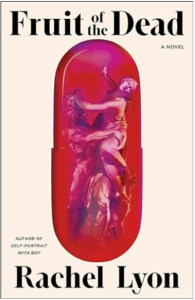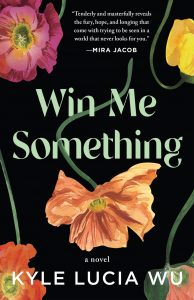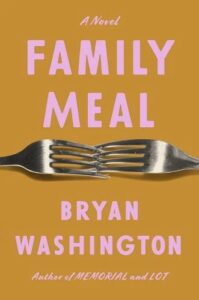Fiction. 320 pgs. Scriber. March 2024. 9781668020852.
As a modern retelling of the Persephone myth, “Fruit of the Dead” is not the Persephone myth you know. A cautionary tale and call to action, Rachel Lyon’s novel reminds us of the danger in silence, of not sharing our experiences of trauma and failure for the benefit of others and ourselves. When we first meet our protagonist, aimless eighteen year-old Cory Ansel, she is wrapping up her time as a camp counselor, dreading returning to the home she shares with her single mother in Manhattan. After a slew of college rejections, Cory declared she would not be going to college, a decision that saddened her mother Emer and left Cory floating into a gap year. On the last day of camp she meets Rolo Picazo, the CEO of a Fortune 500 pharmaceuticals company and father to one of her campers, who offers Cory a job for the remainder of the summer as babysitter to his two kids. With the opportunity to delay returning home to a non-future— and the chance to live on Rolo’s luxurious private island, Little Île des Bienheureux, as a kept nanny for a couple of months culminating in a one-time paycheck of $20,000 in September— Cory signs the NDA that Rolo presents her with and leaves with him and his kids. Upon receiving her daughter’s text message breaking the news that she got a job she can’t talk about at a place she can’t disclose with an employer she can’t name, and therefore won’t be home for another couple of months, Emer begins to stew in worry, ultimately embarking on a hunt for Cory that requires her to reflect on moments of personal failure and trauma. “Let me, her mother, be the hunter who saves her from herself,” Emer resolves (p. 195).
Rolo Picazo makes for a formidable Hades in Lyon’s novel. A middle-aged divorced man, he is taken by Cory’s young beauty when he first spies her playing with paper poppies. However, the danger in Rolo is not only the age difference and off-kilter power dynamic between him and Cory, but rather his experience manipulating young women. We first see this in action when Rolo proposes the nanny job— “(…) your shame at letting Mom down has come out in all kinds of nasty ways. (…) Long story short, neither of you really wants you to come home” (p. 32). Rolo begins his gaslighting of Cory in this moment, by naming her shame and feeding her fear that she has nowhere to go. He can see that Cory has planted seeds of self-doubt in herself, and to manipulate her all he needs is to water them. But, this is not the only weapon in Rolo’s arsenal. Her first night on the island, Rolo introduces Cory to Granadone and Fruit of the Dead— a heavy happy pill produced by his pharmaceutical company and the spiked cocktail that includes it.
When Cory asks if Granadone is addictive, Rolo dismisses her question and purposefully deflects, “People can get addicted to sex, alcohol, chocolate, video games, you name it. (…) Whatever your thing is, you can develop a dependency on it, if you’re not, you know, wise, if you’re not vigilant” (p. 80). This, a convenient way of shifting blame and responsibility back on Cory. A modern-day pomegranate to our 21st century Persephone, Granadone gives Cory a false sense of unbridled joy and the detachment from responsibility that she has been craving. Rolo gives Cory full access to his stash so that she can take Granadone at her leisure, at her will. He knows it is important that Cory think she’s making a choice; he does not have to force her, he merely has to lead her. It is a truth that Lyon massages out of the typical themes of consent, that to protect ourselves from manipulation we must have self-awareness, self-knowledge, and self-love. That to stand up to coerced consent, we must be securely rooted in who we are, our values, our desires, and our boundaries.
Though Cory is told often and by many that she is not trapped in Rolo’s island, she feels as though she has nowhere to go. She is not empowered to leave because there is nothing for her out there, in the real world. As she grows addicted to Granadone, Cory feels the need to leave less and less. Where the original Persephone myth used the maiden’s perpetual travel between Mount Olympus and the Underworld to explain the changing seasons, Lyon uses this repetition to point to the perpetual predation of women. One way in which Lyon highlights that experiences in disrespect and violence are and have been inherent to the experience of womanhood is by employing both Emer and Cory as alternating narrators. By bringing the story to present day, and including both Cory’s narrative in third-person and Emer’s first-person perspective, Lyon creates new context, elevating the story into a most relevant dissection of girlhood, motherhood, and the cyclical history of violence against women. The importance of this reimagining of the Persephone myth is the way Lyon refocuses the lens through which we watch the maiden and her mother in their respective journeys. Lyon’s choice to have Emer speak directly to us does more than distinguish which track we’re following. Cory’s third-person narrative has us watching her with insight but from afar. Emer’s perspective is a grounding force throughout the book, employed skillfully to both contrast and contextualize Cory’s actions and trajectory. By using the first person, Emer’s story, the story that happened before and when Cory was born, becomes as important and relevant as Cory’s current stay in Rolo’s island. That is, for us to understand Cory we must understand Emer.
When Cory arrives at Little Île des Bienheureux she is quickly confused with Kelly, the former babysitter to Rolo’s kids and, as we later piece together, Rolo’s former lover. Throughout her time on the island, Cory is introduced as “the new Kelly,” she is addressed directly as “Kelly” by various staff members, and is referred to as “Not-Kelly” by Rolo’s ex-wife Cricket, who visits the island to pick up the kids. Lyon drops in these instances of mistaken identity regularly enough to subtly plant a seed of caution and dread in Cory and us, but also sporadically enough that each mention catches us off guard. During a Granadone-induced stupor, Cory learns that Kelly did not “go away” as the kids she looked after liked to say. Rather, she had died. Later, in a soft confrontation, Cory asks Rolo what killed Kelly. After a pause, he quietly answered “Kelly just had a little too much fun” (p. 274).
It is not only through the telling of Cory’s story, but through the stories of the women that surround her— Cricket, Emer, Katie— that Lyon brings to light the perpetual nature of abuse and assault. In a particularly revelatory scene, Rolo encourages Cory to wear Cricket’s old dress to a party he’s hosting, further molding her into his ideal. Upon spotting Cory in her former dress, Cricket comments to Cory, “He just loves a new Barbie, doesn’t he?” (p. 217). Later, when Cricket tries to gently encourage Cory to leave the island with her and the kids instead of staying with Rolo, we see in her a hesitation to speak up though she knows she must. In this treading lightly, I was reminded of Maggie Nelson’s analysis of freedom and consent in her book On Freedom. As Nelson offered, “It’s possible to look back at events and choices and determine ourselves to have been freer that we supposed ourselves to be at the time, but more often, I’d wager we feel the opposite—we see, in hindsight, how our lives and choices were determined, perhaps overdetermined, by the forces and patterns that shaped us heretofore, as well as those that shaped the others with whom we collide” (p. 117). By highlighting this, Lyon strengthens the importance of women sharing their experiences. To be shaken into awareness, to combat the guilt we are saddled with when our bodies are violated, we must speak.
Upon reading “Fruit of the Dead,” I knew the time had come to publicly put in writing one of the two things I do not allow myself to put in print. Shortly after we meet Cory the last day of camp, we learn from her that she was sexually assaulted her sophomore year of high school, an event that understandably triggered her downfall in academics and at home. Learning this puts Cory’s perceived lack of direction in perspective and allows us to contextualize her actions, not only in her past but now. Furthermore, when she told her mother about the assault, Emer remained quiet and then, in that silence, left the room. “They never spoke of it again. No charges were filed, no more conversations had, not with Leon’s parents or the school administration,” remembers Cory (p. 74). Emer’s stoic reaction gave way to culpability, with Cory understanding that she was at fault for her attack. Later, Emer recalls what was triggered in her when her daughter confessed to having been traumatized. Suddenly brought back to her own assault, to her own feelings of guilt and shame, Emer became frozen and incapable to respond. In paralleling Cory and Emer’s narratives, Lyon skillfully weaves in how shame manifests itself in our silence.
It has been a shame I know well, and a secret I have kept from my own mother. While the theft of Cory’s virginity happened her sophomore year of high school, mine happened sophomore year of college. A late bloomer, I arrived at NYU with no romantic or sexual history. Instead of slowly growing into my young sensuality, the longer I waited to explore someone’s touch on me, the more I wanted to wait. During my semester abroad, after a night out with my roommates, I stumbled away with a stranger who led me to his car and raped me there. Though I didn’t keep what I would come to call “the incident” from my friends, I never told my parents. This is the first time I’ve made such a thing known so widely, including to my family, assuming they come upon this essay and read it. But “Fruit of the Dead” left no room for doubt— to speak up is necessary and to stay silent is dangerous.
If we are to identify one source of motivation for Cory to stay on Little Île des Bienheureux, that is that helplessness she finds herself trapped in, we must also recognize others. Cory’s decisions reflect her trauma but also reflect her true desire. The warnings she feels in her gut about Rolo are often trumped by her intrigue of him. She enjoys his attention, his leer. However, without a healthy framework and understanding of sex, Cory can not fully acknowledge that she is drawn to Rolo or that she enjoys his lust for her. Maggie Nelson’s On Freedom comes to mind again, as Nelson reflects on the exchange of power that happens when people engage in sexual relationships. She wrote, “(…) many girls are deeply compelled by their desires, but since they don’t have much practice in articulating them, often not even to themselves, they instead become experts at putting themselves in situations in which “trouble” (aka sexual activity) might occur, while agilely blurring out the question of what they might be looking for (alcohol often abets this project)” (p. 93).
Cory’s relationship with her desires is complicated by the fact that she lost her virginity in a sexual assault. As a person whose virginity was also stolen, I found it impossible for my view on sex not to morph, in one way or another, be it slightly or greatly, as a result of rape. (I distinctly remember an ex-boyfriend asking if I enjoyed consensual “rough” sex because my first sexual experience was violent. While the answer was a very clear no, I was forced to reflect on my relationship with intimacy and intercourse and trust. To say that those relationships were not somehow informed by my assault would be a lie. And while I’ve overcome most of the lies imposed on me by my shame, I have not yet overcome others.) Cory’s shame around her attack, perpetuated by her mother’s reaction and general disappointment, led her to feel guilt around wanting sex in general. By not articulating her desires, she could pretend she didn’t have any. She could play with temptation and danger while still claiming innocence. As Nelson stated in her book, “Our desire to retain control over what happens to our bodies and psyches while also seeking experiences of surrender and abandon is a big koan” (p. 124).
When Emer finally finds Cory, she sees her as she is. That is, she sees her changed. “All of these spots and bruises…” Emer observes as she examines her daughter, “And what’s wrong with your eyes, they’re all bloodshot, monkey. It’s like you’re looking at me through frosted glass.” But Cory seems oblivious to her own transformation, “I’m just tired, I just woke up, I’ve been roaming around” (p. 293). Entranced by Granadone, Cory could not see past her own delusion. “Did he hurt you?” Emer asks. “He loves me,” Cory answers. On the boat with her daughter, as they speed away from Rolo’s island, Emer tries to force Cory into reality, exclaiming, “This is how the story ends!” But Cory reflects, “The end is for parables and fairy tales. The end is no realer than a lullaby” (p. 300). It is here that we are forced to face our own reality, the crudest reality of the book. That, despite it being her mother, Cory does not know Emer as much as she thinks she does. That it is dangerous for us to project our traumas and failures rather than share them. That Cory will return to Rolo as Persephone did to Hades, and that perhaps this could have been avoided had we said something.
Fruit of the Dead is available through Scriber. Purchase it now through your local bookstore.
Like what you’re reading?
Get new stories or poetry sent to your inbox. Drop your email below to start >>>
NEW book release
Direct Connection by Laura Farmer. Order the book of stories of which Mike Meginnis says there is “an admirable simplicity at their heart: an absolute, unwavering confidence in the necessity of loving other people.”
GET THE BOOK



